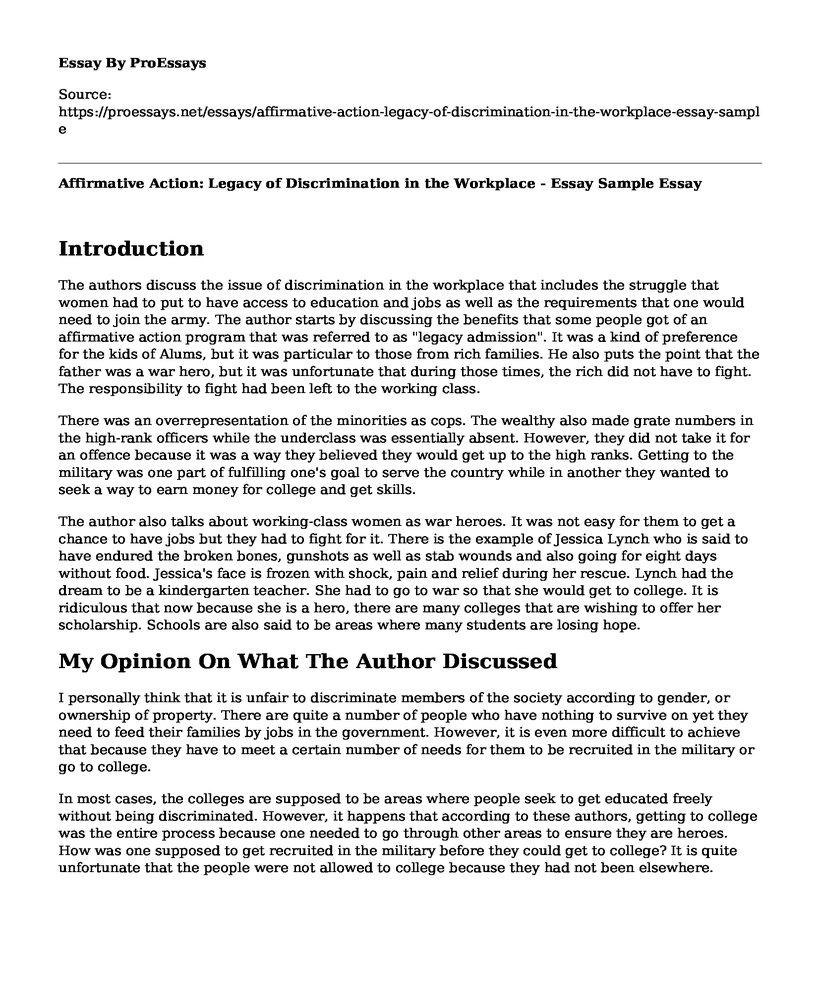Introduction
The authors discuss the issue of discrimination in the workplace that includes the struggle that women had to put to have access to education and jobs as well as the requirements that one would need to join the army. The author starts by discussing the benefits that some people got of an affirmative action program that was referred to as "legacy admission". It was a kind of preference for the kids of Alums, but it was particular to those from rich families. He also puts the point that the father was a war hero, but it was unfortunate that during those times, the rich did not have to fight. The responsibility to fight had been left to the working class.
There was an overrepresentation of the minorities as cops. The wealthy also made grate numbers in the high-rank officers while the underclass was essentially absent. However, they did not take it for an offence because it was a way they believed they would get up to the high ranks. Getting to the military was one part of fulfilling one's goal to serve the country while in another they wanted to seek a way to earn money for college and get skills.
The author also talks about working-class women as war heroes. It was not easy for them to get a chance to have jobs but they had to fight for it. There is the example of Jessica Lynch who is said to have endured the broken bones, gunshots as well as stab wounds and also going for eight days without food. Jessica's face is frozen with shock, pain and relief during her rescue. Lynch had the dream to be a kindergarten teacher. She had to go to war so that she would get to college. It is ridiculous that now because she is a hero, there are many colleges that are wishing to offer her scholarship. Schools are also said to be areas where many students are losing hope.
My Opinion On What The Author Discussed
I personally think that it is unfair to discriminate members of the society according to gender, or ownership of property. There are quite a number of people who have nothing to survive on yet they need to feed their families by jobs in the government. However, it is even more difficult to achieve that because they have to meet a certain number of needs for them to be recruited in the military or go to college.
In most cases, the colleges are supposed to be areas where people seek to get educated freely without being discriminated. However, it happens that according to these authors, getting to college was the entire process because one needed to go through other areas to ensure they are heroes. How was one supposed to get recruited in the military before they could get to college? It is quite unfortunate that the people were not allowed to college because they had not been elsewhere.
Conclusion
In conclusion, it is important that there is no discrimination in the workplace. The rich also need to work. There should be no jobs described for the people living below the poverty lines and for those that are from wealthy families. Jobs need to be assigned according to the skills and knowledge of the individuals performing them. Women need to be given equal chances like men.
Cite this page
Affirmative Action: Legacy of Discrimination in the Workplace - Essay Sample. (2023, Mar 14). Retrieved from https://proessays.net/essays/affirmative-action-legacy-of-discrimination-in-the-workplace-essay-sample
If you are the original author of this essay and no longer wish to have it published on the ProEssays website, please click below to request its removal:
- Is it Ethical to Engage in Office Gossip? HRM Essay Example
- Paper Example on Cyber Bullying as Ethical Issue
- Paper Example on Physician-Assisted Suicide
- Third Gender - Research Paper
- Essay on Understanding Team Members' Behaviors for Optimal Group Performance
- Essay Example on Workplace Violence: Understanding & Mitigating Factors
- Employee Motivation & Emotional Aspects: A Case Study Analysis Example







